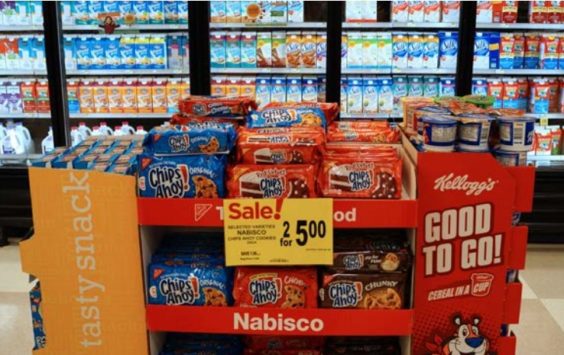
Have you ever wondered why the same stuff is always on sale at your local grocery store? Why there are often store coupons for some products, but never others? Why most grocery stores follow the same general layout, feature the same types of displays, and why your choices seem so limited – and often unhealthy?
Trade promotion and placement fees are common knowledge in the industry. But now a consumer advocacy group wants them to become common knowledge to shoppers – and to federal regulators.
The Center for Science in the Public Interest (CSPI) has published an investigative report that aims to expose the “murky financial arrangements between supermarkets and manufacturers” that help to determine what you buy, and what you feed your family. And the group is calling on the Federal Trade Commission, the Securities and Exchange Commission, and state Attorneys General to investigate whether these practices illegally harm small businesses or consumers.
In “Rigged: Supermarket Shelves for Sale“, independent journalist Gary Rivlin describes a “world of wheeling and dealing,” in which “what customers want often takes a back seat to corporate contracts.”
Even the most casual shopper knows, or assumes, by now that the giant stacks of 12-pack soda cans by the store entrance, the cardboard displays full of a promoted product, and the endcap setups aren’t there because the store just felt like giving a particular product such prominent placement. The products are there because the manufacturer paid for that placement.
And that’s not all the manufacturers pay for. They pay “slotting fees” to get a new product on the shelves. They follow that up with placement fees, to keep their products on the shelves. They cut deals to be featured in the store’s sale circular, to offer store coupons – and to keep potential competitors from doing the same. “Companies spend billions of dollars so that their products are featured and promoted in as many places as possible and in the most attention-getting places in supermarkets, influencing what people purchase and eat,” Rivlin writes in the CSPI report.
That’s why the same big manufacturers’ products always seem to be on sale, and always seem to get the best in-store promotion and placement – because they’re the only manufacturers that can afford it. “As a result, the food system is rigged against everyone but the big food manufacturers with big marketing budgets,” the report reads. “And one way or another the cost is passed along to the consumer.”
The CSPI report uses the example of Clemmy’s, an independently-owned sugar-free ice cream brand introduced in 2007. Jon Gordon, the company’s founder, paid more than a million dollars in slotting fees to get his products into several thousand grocery stores. He paid additional fees – or was forced to provide retailers with tens of thousands of dollars worth of free products – in order to stay in those stores. He agreed to advertise in store circulars and put Clemmy’s on promotion from time to time, and to offer manufacturer’s coupons to help boost sales. And then Gordon said the larger ice cream companies with the bigger budgets exercised their control over the freezer aisles to relegate his products to less prominent positions, if he was able to find space in the store at all.
So he sued Nestle. A federal judge threw out the case. And Clemmy’s filed for bankruptcy last year. It’s “almost impossible for a smaller manufacturer to make it,” Gordon said.
“How many smaller companies (some with better-for-you products) are thwarted at least in part because the big supermarket chains generally charge fees that only the largest manufacturers can pay?” the CSPI report asks.
Knowing some of the inner workings of the system can work to your advantage, sometimes. If you know that manufacturers pay a premium to have their products featured on an endcap or a special display, you’ll know that doesn’t necessarily mean they’re on sale that week, even though the prominent placement might suggest that they are.
And getting to know the regular sales cycles will allow you to hold out for a deal. Whether it’s Coke or Pepsi, you’ve probably noticed that some brand of soft drink is almost always on sale. So you should never pay full price – and you should hope that less-informed shoppers help subsidize your purchases. “Coca-Cola — and the stores — make very little on the two-liter bottles and the 12-packs of cans that stores are constantly running on special,” Rivlin writes. But they make huge profits on those overpriced individual plastic bottles that non-deal seekers will grab near the checkout. “Similarly, Frito-Lay makes a lot more profit on the small $1.49 bags of Doritos people buy on impulse while waiting to pay for their groceries than the big bags advertised in the circular for $3.49,” Rivlin continues.
But should you be buying chips and soft drinks anyway? “Backroom deals should not drive Americans to purchase unhealthy foods in grocery stores,” the report argues. “Supermarket shelves should not be for sale to the highest bidder to the detriment of consumers and small businesses.”
So the report makes several recommendations: The FTC, SEC and state regulators should investigate, to help bring the murky practice of trade promotion out into the open, and to determine whether it violates any antitrust or consumer protection laws. Retailers and manufacturers should promote healthier foods – and if they don’t, local governments should enact “healthy checkout ordinances” to prevent the impulse-buy checkout area from being used to “undermine customers’ diets”.
Until then, the report urges shoppers to be “wary of supermarket trickery,” which has blossomed into an estimated $50-billion-a-year business. “Supermarkets today are as much about selling shelves to food companies as they are about selling food to customers,” the CSPI concludes. “They could do more to put the interests of shoppers — their true customers — before those of big food manufacturers.”
Remember that, the next time you complain about the same products always being on sale, and always being the ones to have coupons available. Buying the most heavily-promoted, prominently-featured, deeply-discounted products may save you money. But when it comes to having real choices, a level playing field for new products, and healthier options overall – the CSPI says there’s much more than saving money at stake.
Image source: Center for Science in the Public Interest











Want to run a TV spot on the Super Bowl? :30 seconds will set you back ~$3MM, an ungodly sum and MUCH more than a typical 30 second spot. But that’s what it costs, because that’s what advertisers will pay.
Clemmy’s has fifty grand for a Super Bowl spot, but the network doesn’t want to sell for that pittance. Is Clemmy’s going to whine & complain & sue because he can’t afford the media?
the Entitlement Butthurt is strong in this one. Grow up, kids. Groceries aren’t a utility; they’re not a public trust. (otherwise there would be grocery stores in economically underdeveloped parts of town. But there aren’t. Which is sad, but it’s rational. It’s bad business.) They’re a for-profit entity.
It’s not exactly new information that retailers make their profits through trade funds. Selling products is super competitive, and a breakeven game. Feel free to listen in on a Safeway earnings call sometime. They’re held quarterly. And they’ll tell you this. Every. Single. Time.
You think you’re giving a dose of reality to the readers out there. You aren’t. All you’re saying is that these aholes are corrupt. We know that. What you’re also saying is that food is for profit and that comes with all the tricks of the trade and that capitalism is basically war of thousands of products all vs each other vs the consumer as well. So essentially you’re almost an apologist for something that is so intrinsic to the health of a nation yet is being mismanaged at best due to the interests of a very few powerful people. That’s BS.